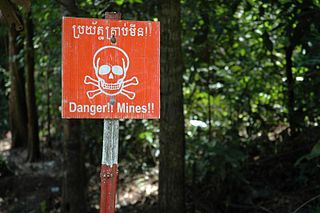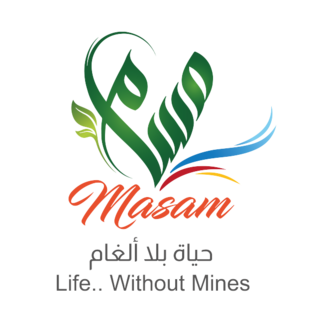The Vietnam Veterans of America Foundation (VVAF), established in 1980, now the Veterans for America (VFA), is a Washington, D.C.-based international humanitarian organization that addresses the consequences of war and conflict. The founder of VVAF is Bobby Muller, a former U.S. Marine lieutenant and Vietnam veteran.

The HALO Trust is a humanitarian non-government organisation which primarily works to clear landmines and other explosive devices left behind by conflicts. With over 10,000 staff worldwide, HALO has operations in 28 countries. Its largest operation is in Afghanistan, where the organization continues to operate under the Taliban regime that took power in August 2021.

Unexploded ordnance, unexploded bombs (UXBs), and explosive remnants of war are explosive weapons that did not explode when they were employed and still pose a risk of detonation, sometimes many decades after they were used or discarded. When unwanted munitions are found, they are sometimes destroyed in controlled explosions, but accidental detonation of even very old explosives also occurs, sometimes with fatal results.

Richard Edmund Neal is an American politician serving as the U.S. representative for Massachusetts's 1st congressional district since 1989. The district, numbered as the 2nd district from 1989 to 2013, includes Springfield, West Springfield, Pittsfield, Holyoke, Agawam, Chicopee and Westfield, and is much more rural than the rest of the state. A member of the Democratic Party, Neal has been the dean of Massachusetts's delegation to the United States House of Representatives since 2013, and he is also the dean of the New England House delegations.
Emergency is a humanitarian NGO that provides free medical treatment to the victims of war, poverty, and landmines. It was founded in 1994. Gino Strada, one of the organization's co-founders, served as EMERGENCY's Executive Director. It operates on the premise that access to high-quality healthcare is a fundamental human right.

Kerry Murphy Healey is President Emerita of Babson College and served as the 70th Lieutenant Governor of Massachusetts from 2003 to 2007 under Governor Mitt Romney. A former member of the Republican Party, she was the party's nominee for Governor of Massachusetts in the 2006 gubernatorial election, but was defeated by Deval Patrick.

Cambodia is a country located in Southeast Asia that has a major problem with landmines, especially in rural areas. This is the legacy of three decades of war which has taken a severe toll on the Cambodians; it has some 40,000 amputees, which is one of the highest rates in the world. The Cambodian Mine Action Centre (CMAC) estimates that there may be as many as four to six million mines and other pieces of unexploded ordnance in Cambodia. Some estimates, however, run as high as ten million mines.
A mine clearance organization, or demining organization, is an organization involved in the removal of landmines and unexploded ordnance (UXO) for military, humanitarian, or commercial reasons. Demining includes mine clearance, as well as surveying, mapping and marking of hazardous areas.

The region of Nagorno-Karabakh and areas around it are considered to be some of the most heavily mined regions of the former Soviet Union. Mines were laid from early 1990s by both Azerbaijani and Armenian forces during and after the First Nagorno-Karabakh War. The worst-affected areas are along the fortified former contact line between Azerbaijani and Armenian forces, in particular in the districts of Aghdam, Fuzuli and Jabrayil. According to military experts from both Azerbaijan and Armenia, the ground in those areas is covered with "carpets of land mines." The region has the highest per capita rate in the world of accidents due to unexploded ordnance.

The Mines Advisory Group (MAG) is a non-governmental organization that assists people affected by landmines, unexploded ordnance, and small arms and light weapons.

The United Nations Mine Action Service (UNMAS) is a service located within the United Nations Department of Peacekeeping Operations that specializes in coordinating and implementing activities to limit the threat posed by mines, explosive remnants of war and improvised explosive devices.

Danish Demining Group (DDG) is the Human Security Unit under the Danish Refugee Council (DRC), specialised in clearing landmines and unexploded ordnance and reducing armed violence.

The Center for International Stabilization and Recovery (CISR), formerly the Mine Action Information Center (MAIC), is a public policy center at James Madison University that manages information, conducts training, holds conferences and workshops, and performs research relevant to humanitarian mine clearance, victim assistance, mine risk reduction and other explosive remnants of war (ERW).
INTERSOS is a non-profit humanitarian aid organization that works to assist victims of natural disaster and armed conflict. INTERSOS has operated as an independent organization since its foundation in 1992. A Mine Action Unit was established within INTERSOS to deal specifically with the mine danger and its effects through mine awareness, victims assistance and mine clearance operations.
The Organization of Amputees Republike Srpske (UDAS) is registered as a nonprofit organization and non-governmental organization based in Banja Luka, Bosnia and Herzegovina (BiH), founded by amputees which are mostly landmine victims in order to provides support for victims of landmines, unexploded ordnance (UXO), cluster munition and other persons with disabilities and their families to integrate them back into the community, thus enabling them to live normal lives.

Kevin O'Sullivan is an American non-profit executive and politician who served as president and CEO of Massachusetts Biomedical Initiatives from 2003 to 2018 and represented the 13th Worcester District in the Massachusetts House of Representatives from 1987 to 1995.

ITF Enhancing Human Security is a humanitarian, non-profit organization founded by the Republic of Slovenia., which specializes in land mine clearance and post-conflict reconstruction. It was established on 12 March 1998 with the purpose of helping Bosnia and Herzegovina in its post-conflict rehabilitation, specifically with mine clearance and assistance to mine victims.
Stephan Hay is an American politician who represented the 3rd Worcester district in the Massachusetts House of Representatives from 2016 to 2021. A member of the Democratic Party, his district included the towns of Fitchburg and Lunenburg.

The Masam Project is a humanitarian landmine clearance project in Yemen, was launched by the Kingdom of Saudi Arabia in June 2018. It works in coordination and partnership with Yemen Executive Mine Action Center (YEMAC) to clear Yemeni territory of indiscriminate Anti-tank (AT) and Anti-personnel mines (AP) along with improvised explosive devices (IED) and unexploded ordnance (UXO) with the aim of controlling the humanitarian catastrophe caused by mines in Yemen.












